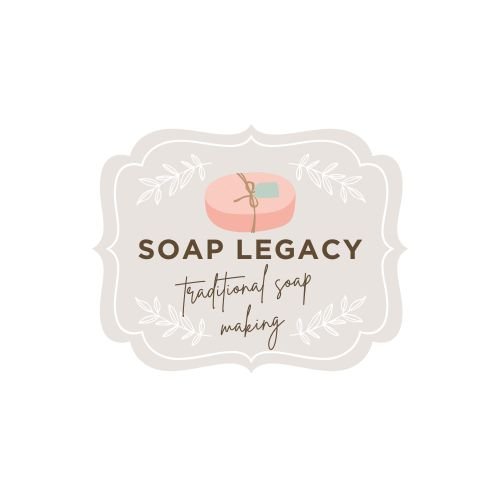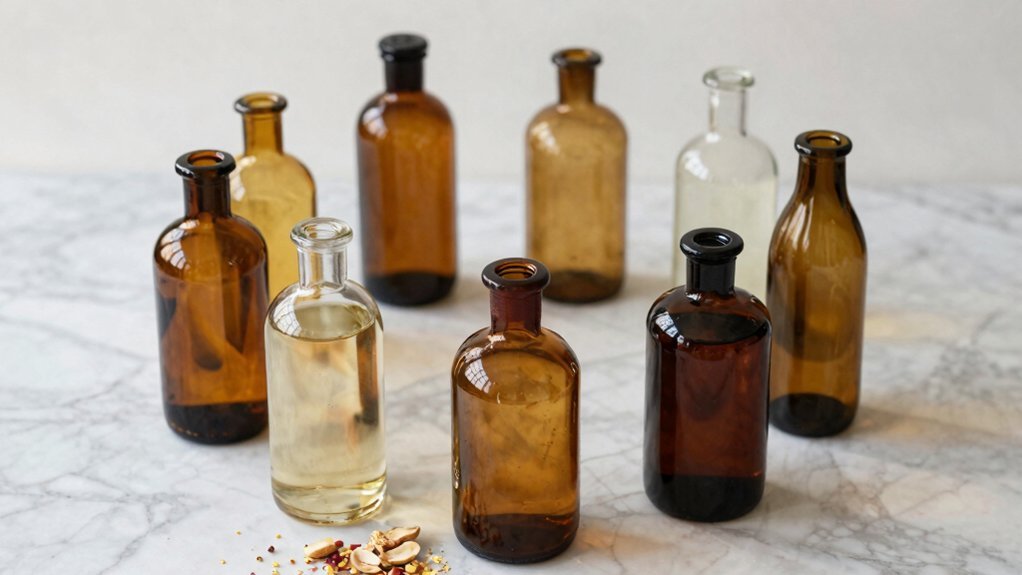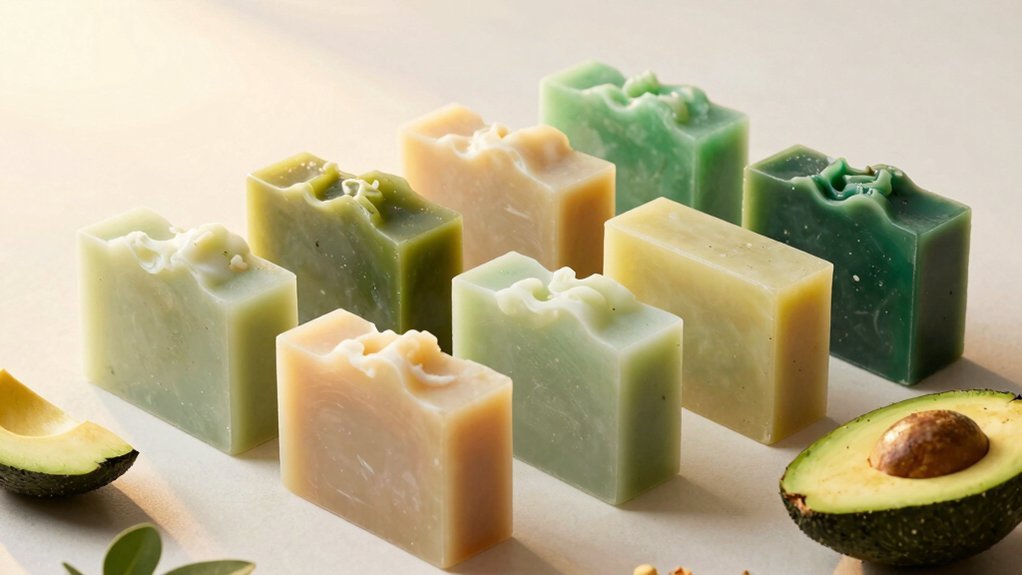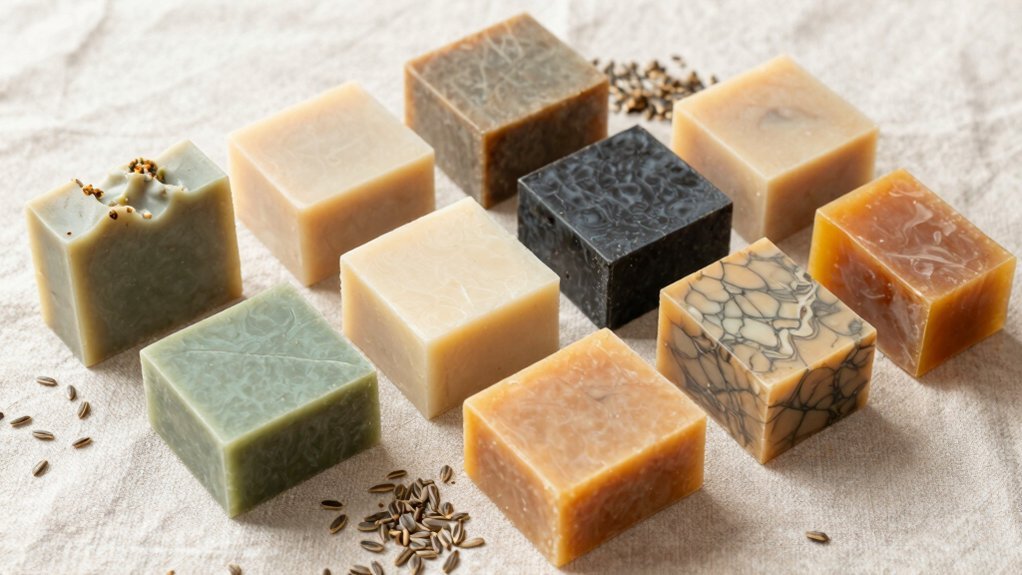Looking to make eco-friendly soap molds? You've got plenty of sustainable options. Start with reclaimed wood or bamboo for natural moisture resistance, or try plant-based alternatives made from cornstarch. Upcycle glass jars and ceramic containers from your kitchen, or explore biodegradable materials that break down naturally. Consider eco-certified plastic alternatives, repurposed household items, or locally sourced clay forms. These earth-conscious choices will transform your soap-making journey into a greener crafting adventure.
Reclaimed Wood and Bamboo Molds

Resourcefulness meets sustainability in the world of soap making with reclaimed wood and bamboo molds.
You'll find these eco-friendly options not only reduce environmental impact but also add unique character to your soap-making projects.
When you choose reclaimed wood for your molds, you're giving salvaged timber a second life while creating one-of-a-kind designs in each soap batch.
Both materials naturally resist moisture and produce bars with crisp, clean edges. You can easily line these molds with grease-proof paper to prevent sticking and preserve their longevity.
Natural moisture resistance and clean-edged results make these materials perfect for soap making, especially when lined with grease-proof paper for protection.
If you're environmentally conscious, bamboo offers an excellent alternative, as it grows quickly and requires minimal resources to cultivate.
Natural Fiber Silicone Alternatives
While traditional silicone molds dominate the soap-making market, natural fiber alternatives now offer crafters an innovative and eco-conscious choice. You'll find these plant-based molds, made from materials like cornstarch and bamboo, pair perfectly with natural colorants while maintaining professional-quality results.
| Feature | Benefit | Impact |
|---|---|---|
| Heat Resistant | Withstands 400°F | No warping |
| Chemical-Free | Safe for skin | Toxin-free soaps |
| Flexible Design | Easy unmolding | Less waste |
These sustainable molds deliver the same flexibility you've come to expect from silicone, but they're completely biodegradable. You won't need additional liners or preparation steps, making your soap-making process simpler and more environmentally friendly. By choosing these alternatives, you're reducing plastic waste while creating beautiful, natural soaps that align with eco-conscious values.
Upcycled Glass and Ceramic Containers

Three everyday household items – glass jars, vintage teacups, and ceramic bowls – can transform into distinctive soap molds that add character to your creations.
These upcycled glass and ceramic containers offer both sustainability and practicality to your soap-making process, preventing waste while ensuring easy removal of finished products.
Repurpose everyday glass and ceramic items into soap molds, combining eco-friendly practices with practical crafting solutions.
You'll find that both materials provide excellent non-porous surfaces, making cleanup a breeze and allowing for repeated use in future projects.
When selecting ceramic containers or glass pieces for soap molds, inspect them carefully for any damage that could compromise your final product.
The variety of shapes and sizes available lets you experiment with unique designs – from elegant teacup soaps to rustic mason jar bars.
Biodegradable Plant-Based Materials

You'll find bamboo molds particularly appealing for soap making, as they offer natural temperature resistance and create crisp, clean edges while breaking down harmlessly in landfills.
The natural fibers in plant-based materials like cornstarch and bamboo release your soaps effortlessly, eliminating the need for synthetic releasing agents.
Paper-based options, including biodegradable cardboard molds, provide an accessible entry point into eco-friendly soap making while supporting your commitment to sustainable crafting practices.
Bamboo Mold Benefits
Crafters seeking sustainable soap-making solutions will find bamboo molds to be an ideal choice. When you're making soap, these eco-friendly alternatives to plastic molds offer durability and heat resistance, ensuring your creations won't be compromised by warping during the process.
You'll appreciate bamboo molds' natural antibacterial properties, which help keep your soap-making environment cleaner by preventing unwanted mold growth.
As you explore sustainable crafting options, you'll discover that bamboo molds support environmental conservation in two significant ways. First, they reduce plastic waste by providing a reusable, plant-based alternative.
Second, they're made from a rapidly renewable resource that quickly regenerates after harvesting. By choosing bamboo molds, you're not only creating beautiful soaps but also contributing to sustainable forestry practices.
Natural Fiber Release Properties
Natural fiber release properties found in biodegradable soap molds offer a significant advantage over synthetic alternatives. When you're using biodegradable plant-based materials like bamboo or hemp, you'll notice how easily your soaps release from the molds without requiring chemical treatments or coatings.
These natural fiber release properties work alongside the material's porous nature, which helps manage moisture during the curing process. You'll achieve smoother soaps while supporting eco-friendly practices.
The molds also add unique textures to your finished products, enhancing their visual appeal naturally. As your molds eventually decompose, you're contributing to environmental sustainability.
Materials like cornstarch and cellulose are transforming soap making by providing green alternatives that meet both your crafting needs and growing consumer demand for sustainable products.
Eco-Friendly Paper Options
In line with sustainable soap making practices, biodegradable paper options have revolutionized DIY mold creation.
You'll find that these eco-friendly paper options, sourced from sustainable forestry, decompose naturally while offering excellent functionality for your soap making projects.
When you're crafting soaps, you can rely on plant-based paper molds that withstand temperatures up to 145 degrees F, making them perfect for various recipes.
By choosing these materials, you're not only creating beautiful soaps but also eliminating plastic waste from your production process.
You'll appreciate how these molds let you customize shapes while maintaining environmental responsibility.
The switch to biodegradable paper molds supports forest conservation and responsible resource management, ensuring your creative soap making endeavors align with earth-friendly practices.
Repurposed Kitchen Containers

Resourceful soap makers can breathe new life into everyday kitchen containers by transforming them into sustainable soap molds.
You'll find that common items like Pringles cans, milk cartons, and yogurt pots are perfect candidates for repurposed kitchen containers, offering unique shapes and sizes for your handmade soaps.
Before using these containers, make sure you:
- Clean them thoroughly to remove all food residues
- Measure their volume to calculate the right amount of soap mixture
- Check that they're completely dry to prevent contamination
These plastic containers are durable enough to withstand the soap-making process, making them an excellent eco-friendly alternative to commercial molds.
You'll not only reduce waste but also create distinctive soap designs that'll make your creations stand out.
The versatility of these repurposed containers allows you to experiment with various shapes and sizes.
Eco-Certified Plastic Alternatives
Beyond repurposed containers, modern soap makers can explore eco-certified plastic alternatives that offer both sustainability and professional-grade quality.
These innovative materials are crafted from renewable resources, reducing your reliance on fossil fuels while maintaining the durability you need for soap making.
You'll find that eco-certified plastic alternatives like PLA can withstand temperatures up to 145 degrees F, making them perfect for your soap crafting needs.
They're designed to break down in industrial composting facilities, helping you minimize your environmental impact.
By choosing these sustainable molds, you're not just creating beautiful soaps – you're contributing to a circular economy and reducing pollution.
Plus, you'll appeal to eco-conscious customers who value green manufacturing practices in their handmade soap purchases.
Locally Sourced Natural Clay Forms
Your local clay forms will need 24-48 hours to dry completely before use as soap molds, depending on your region's humidity levels and clay thickness.
You'll find that applying natural oils like olive or coconut oil as mold release agents works effectively with clay's porous surface, making soap removal easier.
Check with nearby pottery studios, art supply stores, or geological surveys to source quality clay varieties native to your area, ensuring the most sustainable and cost-effective options for your soap-making projects.
Clay Drying Time Requirements
When working with locally sourced natural clay for soap molds, proper drying time is essential for creating durable and reliable forms.
You'll need to allow 24 to 48 hours for your clay molds to air dry completely, depending on your environment's humidity and the thickness of your clay.
To guarantee your molds are ready for soap-making, follow these key steps:
- Place your clay molds in a warm, dry area or use a fan to speed up the drying process.
- Test the clay's readiness by gently pressing on it – if it feels cool or damp, it needs more time.
- Allow for additional curing days after initial drying to maximize durability.
Mold Release Techniques
Natural clay molds offer excellent release properties for handmade soaps, but proper preparation guarantees consistently smooth results. You'll find that clay molds require minimal intervention for successful soap removal, especially when you follow proper release techniques.
| Technique | Benefit |
|---|---|
| Pre-oiling | Guarantees effortless removal |
| Light coating | Prevents soap sticking |
| Natural oils | Maintains sustainability |
| Warm water cleaning | Preserves mold integrity |
| Minimal lining | Reduces waste |
To maximize your clay molds' release properties, apply a thin layer of olive or coconut oil before pouring your soap mixture. This natural coating works with the clay's inherent properties to create an ideal release surface. After unmolding, you can easily clean your molds with warm water, maintaining their sustainable qualities for future use. The clay's heat retention properties will help achieve proper gelling while guaranteeing your soap releases smoothly.
Regional Clay Source Options
Local clay sources abound across different regions, offering DIY soap makers sustainable and cost-effective mold materials.
You'll find that community pottery studios and local artisans often provide access to natural clay varieties with distinct mineral compositions. These regional differences create unique opportunities for your soap-making experiments, affecting the texture and finish of your final products.
When sourcing local clay for your soap molds, consider these key options:
- Contact nearby pottery studios that sell earthenware clay suitable for molding
- Connect with ceramic artisans who can recommend specific clay types based on your region's natural deposits
- Visit local craft cooperatives that source and process clay from surrounding areas
Frequently Asked Questions
What Is the Best Material for Soap Molds?
You'll find silicone is your best choice for soap molds since it's non-toxic, durable, and releases soap easily. It won't warp under high temperatures and doesn't need additional lining for successful unmolding.
How to Make Environmental Friendly Soap?
You'll need organic oils, natural lye, and biodegradable additives like essential oils and herbs. Use water-saving techniques, choose eco-friendly packaging, and source local ingredients to create environmentally sustainable soap at home.
What Can You Use as a Substitute for Soap Molds?
You can use Pringles cans, milk cartons, yogurt containers, or silicone baking molds for your soap making. Don't forget that lined cardboard boxes and clean takeaway containers work great too!
Is Handmade Soap Eco Friendly?
Yes, your handmade soap is eco-friendly when you're using natural ingredients and sustainable oils. You'll reduce plastic waste, avoid harmful chemicals, and create biodegradable products that won't damage aquatic ecosystems.
In Summary
Making your own sustainable soap molds doesn't just help the environment – it'll save you money and add unique character to your creations. Whether you're using reclaimed wood, natural fibers, or upcycled containers, you're taking an important step toward eco-friendly crafting. Try combining different sustainable materials to create your perfect mold, and you'll discover that going green with your soap making is easier than you think.





Leave a Reply